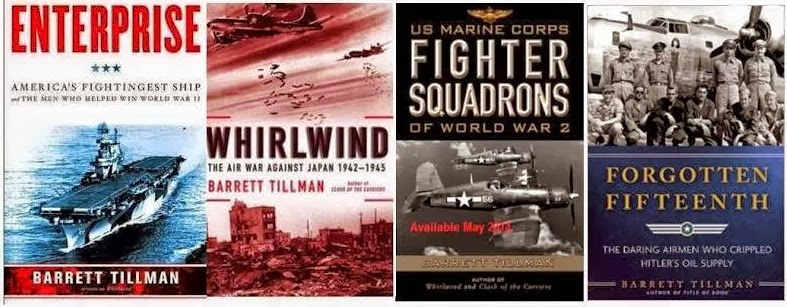I’m starting the new year with a lingering question I’ve wanted to ask reporter Tom Brokaw for decades. (Well, OK, two questions starting with why he didn't attend Joe Foss' memorial service, considering what Joe did for him for decades.)
Actually, I did post that question on Brokaw’s Facebook page but never got the courtesy of a response.
The burr beneath the proverbial saddle is Brokaw’s 1998 best seller, The Greatest Generation. In the past twenty years the phrase has become so ingrained in the national psyche that it’s used reflexively, as in “an involuntary and nearly instantaneous movement in response to a stimulus.” That’s one of the dictionary definitions, and it fits “TGG” perfectly.
Anytime the World War II generation of Americans is referenced, you can set your calendar by the certainty of a TGG comment. More often than not, it seems to come from people who are too young to have grown up around “War Two” veterans, which might make the situation even worse. Absent any depth of knowledge of the era, let alone the wider panorama of American history, the knee-jerk reaction is unlikely to be modified.
But to return to the main point:
Does Tom Brokaw REALLY believe The Greatest Generation hype?
It's totally unsupportable. In fact, Joe often said, "We weren't the greatest--we just did what we had to do.”
More recently, Dutch Van Kirk, who dropped the Hiroshima atomic bomb that hastened the end of World War II, expressed an identical sentiment.
Meanwhile, I can count on one hand the number of U.S. World War II vets who bought into TGG puffery, with fingers left over.
Some highly competent historians have weighed in, noting that in 1940-42 the world appeared teetering on the verge of Axis victory as Germany, Japan, and even Italy swept from one triumph to another. But the trend abruptly reversed in ’42 with strategic Allied victories at Midway in the Pacific in June and at El Alamein in North Africa during October-November. Furthermore, the German debacle at Stalingrad overlapped five months in 1942-43. By then, the first U.S. offensive of the war, at Guadalcanal in the Solomon Islands, approached its climax, forever ending Japanese prospects for the strategic offensive.
However grim things might have appeared at the time, with just a bit of perspective the reality is clear. The Second World War was not going to be won by anyone except the Allies. It says more of the military ability of the Axis that basically three nations (and Italy was on both sides!) tied the rest of the world in knots for six years. Maybe that wasn't as evident early on, but astute Germans recognized the facts. I knew the former Luftwaffe fighter chief, General Adolf Galland, who said that the war was lost when Hitler attacked Russia, let alone when he declared war on America six months later.
Briefly:
Depending on the timeframe, the Axis was outnumbered between 5 and 6-1 for most of the war. (The British Empire, Russia and China ferpetesake!) By the time the Latin American piling-on ended in ’45, the disparity was more like 8-1.
Moreover, the Axis was out-produced by something approaching infinity. Just two examples: the U.S. built 34 million tons of merchant shipping; Japan produced barely 4 million. America rolled out more than 30,000 multi-engine bombers; Germany not quite 1,200.
The Axis had no way to conquer America--Germany and Japan couldn't even get here, even assuming adequate numbers. Yet assuming Axis conquests over all of Europe and the Asia-Pacific region, for Germany, Japan and their acolytes (such as Bulgaria and Thailand), occupying such a huge portion of Earth’s surface would have spread the fascists far too thin. They simply could not have conquered “Fortress Amerika.”
Yet some analysts conclude that the U.S. would have been forced into economic servitude to the Axis, without access to foreign markets.
That dog don’t hunt. For comparison, remember that the U.S. not only dealt with an existential threat for fifty years, but continued supporting the Soviet Union with vital sales—not least of which was food. As a former wheat rancher, I can say that although our Pacific Northwest product went to Asian markets, much Midwest grain went to Russia, which managed to bungle the Ukrainian bread basket for decades.
Therefore, while facing the potential for thermonuclear incineration, old Uncle Sam propped up his bitterest enemy at the same time. (One is reminded of the Marxist mantra: capitalists would sell the hangman the rope he would use on them.)
What we should remember, however, is that the War Two generation of Americans helped return dozens of countries to their rightful owners. That fact is too often ignored.
So, to conclude: Who was the greatest generation?
It's absurd that anybody still argues the point.
IT WAS THE FOUNDERSwho, as Benjamin Franklin said in the delightful musical 1776, the nascent Republic overcame far greater odds than a kinder Providence would have ordained. The colonies fought an eight-year war against the greatest empire on Earth, with the leaders facing the gallows if they failed. Although we owe a tremendous debt to France (repaid at least twice), World War II doesn't even belong on the same page as the Revolution.
After that, TGG was the pioneers who trekked the Oregon Trail. Long ago I transcribed my maternal great-great grandmother's 1852 journal. She and thousands of others set out from Missourah walking 2,100 miles in a five-month race to beat winter in time to establish quarters in the Willamette Valley.
As frontier scout Kit Carson allegedly said, "The cowards never started and the weak died on the way."
Those people had HEART.
Before closing, I’d like to put in a word for my grandparents’ generation. Those were the Americans who dealt with The Great Depression as adults, and raised the World War II crop.
Anyone with the right contacts, feel free to copy to Mr. Brokaw.



